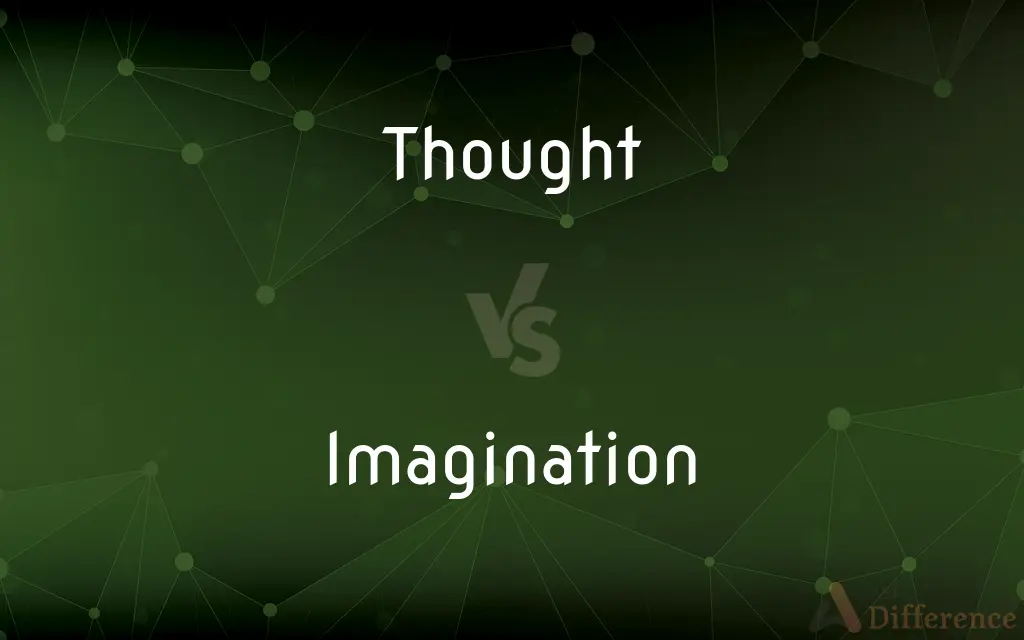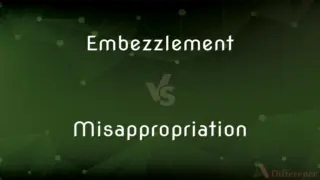Thought vs. Imagination — What's the Difference?
Edited by Tayyaba Rehman — By Fiza Rafique — Updated on September 21, 2023
Thought encompasses all mental processes, including reasoning, planning, and problem-solving. Imagination, a subset of thought, focuses on creating mental images or concepts not present to the senses. Thought is analytical; imagination is creative.

Difference Between Thought and Imagination
Table of Contents
ADVERTISEMENT
Key Differences
Thought is a broad term that encompasses all mental activities, including perception, memory, judgment, and reasoning. It involves processing information, formulating ideas, and considering options. Thought is a cognitive function that enables us to understand the world around us and make decisions.
Imagination, on the other hand, is a specific form of thought focused on generating new ideas, concepts, or images not grounded in sensory perception. It is the capacity to envision things that do not currently exist, allowing us to explore possibilities beyond our immediate environment.
Thought and imagination are interconnected but serve different functions. Thought is analytical, practical, and often based on factual data or empirical evidence. It helps us make informed decisions, evaluate outcomes, and solve problems. It involves critical thinking and logical reasoning.
Imagination is more abstract and less constrained by reality. It allows us to dream, innovate, and think outside the box. While thought leads to conclusions based on facts, imagination leads to the creation of something new: stories, inventions, or alternative solutions to problems.
Comparison Chart
Nature
Broad term for all mental activities
A specific form of thought
ADVERTISEMENT
Function
Analytical, problem-solving
Creative, inventive
Grounding
Often based on sensory perception or data
Not necessarily based on current reality
Use
Understanding, decision-making
Dreaming, innovating
Mental Process
Cognitive
Abstract
Compare with Definitions
Thought
The process of using one's mind to consider something.
He paused for thought before answering.
Imagination
The mental ability to form sensory experiences.
Children often have a vivid imagination.
Thought
An idea or opinion produced by mental activity.
The thought of losing never crossed her mind.
Imagination
The ability to create new ideas or images.
Her imagination knows no bounds.
Thought
A unit of cognitive information.
A single thought can change your entire day.
Imagination
A creative faculty of the mind.
Imagination is more important than knowledge.
Thought
The act of considering or reflecting on something.
Give some thought to your future.
Imagination
The capacity to think creatively or inventively.
It takes imagination to solve complex problems.
Thought
Thought (or thinking) encompasses a flow of ideas and associations that can lead to logical conclusions. Although thinking is an activity of an existential value for humans, there is still no consensus as to how it is adequately defined or understood.
Imagination
The act of envisioning things not present to the senses.
He built a castle in his imagination.
Thought
Past tense and past participle of think.
Imagination
Imagination is the ability to produce and simulate novel objects, sensations, and ideas in the mind without any immediate input of the senses. It is also described as the forming of experiences in one's mind, which can be re-creations of past experiences such as vivid memories with imagined changes, or they can be completely invented and possibly fantastic scenes.
Thought
The process of thinking; cogitation
Sitting deep in thought at the computer.
Imagination
The faculty or action of forming new ideas, or images or concepts of external objects not present to the senses
Her story captured the public's imagination
She'd never been blessed with a vivid imagination
Thought
A product of thinking or other mental activity
What are your thoughts on this matter?.
Imagination
The ability to form mental images of things that are not present to the senses or not considered to be real
The author uses her imagination to create a universe parallel to our own.
Thought
The faculty of thinking or reasoning
Why not use thought instead of emotion to solve the problem?.
Imagination
The formation of such images
A child's imagination of monsters.
Thought
The intellectual activity or production of a particular time or group
Ancient Greek thought.
Deconstructionist thought.
Imagination
One of these mental images
"some secret sense ... which ... took to itself and treasured up ... her thoughts, her imaginations, her desires" (Virginia Woolf).
Thought
Consideration; attention
Didn't give much thought to what she said.
Imagination
The mind viewed as the locus or repository of this ability or these images
"This story had been rattling around in my imagination for years" (Orson Scott Card).
Thought
Intention; purpose
My thought is to live in a house on a lake.
Imagination
The ability to confront and deal with reality by using the creative power of the mind; resourcefulness
Handled the problems with great imagination.
Thought
Expectation or conception
She had no thought that anything was wrong.
Imagination
Attention, interest, or enthusiasm
An explorer's ordeal that caught the imagination of the public.
Thought
(countable) Representation created in the mind without the use of one's faculties of vision, sound, smell, touch, or taste; an instance of thinking.
The greatest weapon against stress is our ability to choose one thought over another.
Imagination
The image-making power of the mind; the act of mentally creating or reproducing an object not previously perceived; the ability to create such images.
Imagination is one of the most advanced human faculties.
Thought
(uncountable) The operation by which mental activity arise or are manipulated; the process of thinking; the agency by which thinking is accomplished.
Without freedom of thought there can be no such thing as wisdom, and no such thing as public liberty without freedom of speech.
Imagination
Particularly, construction of false images; fantasizing.
You think someone's been following you? That's just your imagination.
Thought
(uncountable) A way of thinking (associated with a group, nation or region).
Traditional eastern thought differs markedly from that of the west.
Imagination
Creativity; resourcefulness.
His imagination makes him a valuable team member.
Thought
Anxiety, distress.
Imagination
A mental image formed by the action of the imagination as a faculty; something imagined.
Thought
(uncountable) The careful consideration of multiple factors; deliberation.
After much thought, I have decided to stay.
Imagination
The imagine-making power of the mind; the power to create or reproduce ideally an object of sense previously perceived; the power to call up mental imagines.
Our simple apprehension of corporeal objects, if present, is sense; if absent, is imagination.
Imagination is of three kinds: joined with belief of that which is to come; joined with memory of that which is past; and of things present, or as if they were present.
Thought
A very small amount, distance, etc.; a whit or jot.
Imagination
The representative power; the power to reconstruct or recombine the materials furnished by direct apprehension; the complex faculty usually termed the plastic or creative power; the fancy.
The imagination of common language - the productive imagination of philosophers - is nothing but the representative process plus the process to which I would give the name of the "comparative."
The power of the mind to decompose its conceptions, and to recombine the elements of them at its pleasure, is called its faculty of imagination.
The business of conception is to present us with an exact transcript of what we have felt or perceived. But we have moreover a power of modifying our conceptions, by combining the parts of different ones together, so as to form new wholes of our creation. I shall employ the word imagination to express this power.
Thought
Simple past tense and past participle of think
Imagination
The power to recombine the materials furnished by experience or memory, for the accomplishment of an elevated purpose; the power of conceiving and expressing the ideal.
The lunatic, the lover, and the poetAre of imagination all compact . . . The poet's eye, in a fine frenzy rolling,Doth glance from heaven to earth, from earth to heaven,And as imagination bodies forthThe forms of things unknown, the poet's penTurns them to shapes, and gives to airy nothingA local habitation and a name.
Thought
The act of thinking; the exercise of the mind in any of its higher forms; reflection; cogitation.
Thought can not be superadded to matter, so as in any sense to render it true that matter can become cogitative.
Imagination
A mental image formed by the action of the imagination as a faculty; a conception; a notion.
The same power, which we should call fancy if employed on a production of a light nature, would be dignified with the title of imagination if shown on a grander scale.
Thought
Meditation; serious consideration.
Pride, of all others the most dangerous fault,Proceeds from want of sense or want of thought.
Imagination
The formation of a mental image of something that is not perceived as real and is not present to the senses;
Popular imagination created a world of demons
Imagination reveals what the world could be
Thought
That which is thought; an idea; a mental conception, whether an opinion, judgment, fancy, purpose, or intention.
Thus Bethel spoke, who always speaks his thought.
Why do you keep alone, . . . Using those thoughts which should indeed have diedWith them they think on?
Thoughts come crowding in so fast upon me, that my only difficulty is to choose or to reject.
All their thoughts are against me for evil.
Imagination
The ability to form mental images of things or events;
He could still hear her in his imagination
Thought
Solicitude; anxious care; concern.
Hawis was put in trouble, and died with thought and anguish before his business came to an end.
Take no thought for your life, what ye shall eat, or what ye shall drink.
Imagination
The ability to deal resourcefully with unusual problems;
A man of resource
Thought
A small degree or quantity; a trifle; as, a thought longer; a thought better.
If the hair were a thought browner.
This [faculty], to which I gave the name of the "elaborative faculty," - the faculty of relations or comparison, - constitutes what is properly denominated thought.
Thought
The content of cognition; the main thing you are thinking about;
It was not a good idea
The thought never entered my mind
Thought
The process of thinking (especially thinking carefully);
Thinking always made him frown
She paused for thought
Thought
The organized beliefs of a period or group or individual;
19th century thought
Darwinian thought
Thought
A personal belief or judgment that is not founded on proof or certainty;
My opinion differs from yours
What are your thoughts on Haiti?
Thought
Intellectual reasoning or judgment.
He was admired for his clear thought.
Common Curiosities
What is imagination?
Imagination is the ability to create mental images or concepts not present to the senses.
How are thought and imagination different?
Thought is analytical and practical, while imagination is creative and abstract.
Can thought exist without imagination?
Yes, thought can be analytical without involving imagination.
What is thought?
Thought is mental activity encompassing reasoning, planning, and perception.
Are imagination and thought the same?
No, imagination is a subset of thought focused on creativity.
Can imagination exist without thought?
No, imagination is a form of thought.
Is imagination always unrealistic?
No, imagination can lead to practical solutions and real-world innovations.
Is thought always logical?
Thought aims to be logical but can be influenced by emotions or biases.
How does thought work?
Thought involves cognitive processes to understand, evaluate, and decide.
What is the value of thought?
Thought is vital for understanding, decision-making, and problem-solving.
What is the value of imagination?
Imagination fuels creativity, innovation, and artistic expression.
How does imagination work?
Imagination employs mental faculties to create new ideas or concepts.
Are thought and imagination related to intelligence?
Both are cognitive functions but are not the sole indicators of intelligence.
Can you improve your imagination?
Yes, through creative activities and exposure to different perspectives.
Can you improve your thought processes?
Yes, through education and cognitive exercises.
Share Your Discovery

Previous Comparison
Beloved vs. Loved
Next Comparison
Embezzlement vs. MisappropriationAuthor Spotlight
Written by
Fiza RafiqueFiza Rafique is a skilled content writer at AskDifference.com, where she meticulously refines and enhances written pieces. Drawing from her vast editorial expertise, Fiza ensures clarity, accuracy, and precision in every article. Passionate about language, she continually seeks to elevate the quality of content for readers worldwide.
Edited by
Tayyaba RehmanTayyaba Rehman is a distinguished writer, currently serving as a primary contributor to askdifference.com. As a researcher in semantics and etymology, Tayyaba's passion for the complexity of languages and their distinctions has found a perfect home on the platform. Tayyaba delves into the intricacies of language, distinguishing between commonly confused words and phrases, thereby providing clarity for readers worldwide.















































